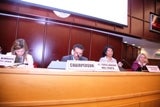Some 350 participants , including Ministers of Health, senior government officials, health programme managers, clinicians and heads of health training institutes, from 36 African countries, met in Addis Ababa between 29 June and 2 July 2009 in a conference on "Human Resources for Maternal Survival: Task-shifting to Non-Physician Clinicians". The four-day conference focused on seeking strategies for developing and deploying non-physician clinicians (NPCs) as an important means of reducing maternal death and disability in Africa.
Opening the conference, Ethiopia's Minister of Health, Dr. Tedros Adhanom Ghebreyesus, emphasized the need to dramatically expand and strengthen Africa's health workforce so as to improve the survival and health of mothers and children.

He exhorted participants to "go beyond re-affirming our collective resolve to act on the crisis and craft and refine more informed policies and strategies that would improve the health of mothers and their chances of survival during pregnancy and childbirth".
Also speaking during the occasion, Dr. Werner Haug, Director of the Technical Division in UNFPA, the United Nations Population Fund, stressed the need to keep the promise of ensuring universal access to reproductive health by 2015.
"The challenge is to produce health professionals with the right skills and in sufficient numbers to provide family planning services in every community and basic and comprehensive emergency obstetric and newborn care in every district," Dr. Haug stated. "This is an issue of equity, social justice and human rights."
In a keynote address to the conference, Prof. Lynn Friedman, Director of the Averting Maternal Death and Disability programme (AMDD) of the Mailman School of Health in Columbia University, described maternal health problems as a fundamental human rights issue. "We need to see health problems and health systems through the eyes and the experience of the people who suffer those problems and who make up the systems."
Many African countries currently face huge shortages in healthcare personnel, due mostly to brain drain. There are fewer than five doctors for every 100,000 people in the continent; and each year, 20,000 health professionals abandon their posts in rural areas in pursuit of more lucrative jobs in urban areas or abroad.
In some countries NPCs, known variously as clinical officers, "tecnicos de cirurgia", and including midwives and nurse/midwives, often provide emergency obstetric care (EmOC) and increasingly take on specialized or higher-level clinical procedures such as surgery, conventionally associated with faculty-trained doctors and specialists.
The conference on Human Resources for Maternal Survival: Task-shifting to Non-Physician Clinicians is a collaborative effort of the Ethiopian Ministry of Health, AMDD, UNFPA, UNICEF, and WHO.

